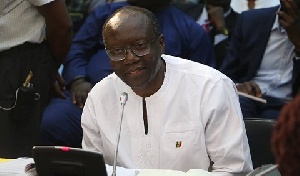 Kenneth Nana Yaw Ofori-Atta, Finance Minister
Kenneth Nana Yaw Ofori-Atta, Finance Minister
Discussions between Ghana’s economic team and the International Monetary Fund (IMF) are set to generate revised targets which should see the Ghanaian economy placed on a sound footing after years of turbulence.
Economists are confident the Fund will want to see the country meet all missed targets especially the fiscal deficit which is reported to be heading into double digits.
“New targets have to be set, new measures have to be taken, and new forecasts have to be generated,” one economist told Business Finder.
Economist Dr Eric Osei Assibey of the University of Ghana, Legon said: “I do not see why we should stick to the set targets which have been woefully missed; to be fair to the new government it is only proper that the new targets are based on its own programme.”
He maintained that government’s homegrown programme should feed into the IMF’s programme to make it relevant for the country.
Dr Assibey advised government in revising the targets to be minded by both internal and external factors that affect the country’s economy.
The ruling New Patriotic Party (NPP) has not hidden its intention to provide some fiscal stimulus in terms of tax cuts and other reliefs to get the private sector thriving again.
Finance Minister, Mr Ken Ofori Atta has hinted that government’s economic team will push for changes in the Fund’s conditions to meet government’s fiscal policies.
According to him, it is imperative for such adjustments since it will guarantee economic development under the new administration.
“We will need to sit down with the IMF to discuss how well the programme fits within our stated goals and objectives and discuss and agree on any tweaking that we may do going forward,” the Minister said in a press briefing.
It will be recalled that Senior Minister Yaw Osafo Maafo had at his vetting indicated that the IMF itself would request a review of the programme since most of the targets had been missed.
Government has recently revealed that the country will miss its growth, fiscal deficit and primary balance targets.
Ghana’s primary balance, according to the Finance Minister is in the negative from a projected target of 1.3 percent set by the John Mahama administration.
Economic research institutions such as umb Stockbrokers have projected a GPD for the first quarter of this year to hinge between 4.8 and 5.2 percent.
The World Bank and the IMF remain positive about Ghana’s outlook, projecting 6 and 4 per cent growth respectively for the economy in 2017 on the back of expected boost in oil revenue inflows from the development new fields.
Moody’s said Ghana’s economic growth will accelerate to 6.5 percent in 2017 and 7.5 percent next year, from 3.8 percent in 2016.
The forecast for GDP by the previous government for 2016 was 4.1 percent while the IMF had a forecast of 3.3 percent. Analysts are not certain whether or not the GDP targets have been missed as data remains unavailable.
The totality of government's tax and expenditure policies (including those related to electoral pledges) must lead to a lowering of the deficit from the 2016 level, the economists maintain.
This paper’s interaction with analysts reveal fears of other targets such as zero new arrears accumulation and the wage bill ceiling also being missed if what we're hearing about unreported data is to be believed.
The inflation target was missed too at 15.4 per cent against -8±2 per cent.
A positive primary balance (that is, a primary surplus) is seen by economists as contributing to improve debt sustainability, while a negative primary balance (a primary deficit) is seen as worsening debt sustainability.
Other analysts Business Finder spoke to maintained that “the fundamental point is that once crucial targets have been missed, the programme cannot proceed as originally planned.”